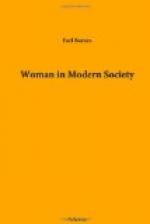If a happy home were the universal destiny of women, our problem would be greatly simplified; but this is far from being the case. Not more than one-half of all women over fifteen are married at any one moment. From the ages of twenty to thirty-five, one-half are married; but it is only from thirty-five to fifty-five that as many as three-fourths are married; over fifty-five there are less than one-half married, and most of the others are widows.[40] Most of these women who are not married must work outside the home, and no girl, rich or poor, should be allowed to reach maturity without being prepared to face this possibility. Work is not a curse but a blessing; it is an indispensable part of every well-ordered life; and without it, the individual and the group will certainly degenerate. Rich and foolish parents, who cannot realize this basal fact, should nevertheless see that, even as insurance, their daughters must be able to pay their way in life, if need comes, without selling themselves either in marriage or out. Even if the woman marries happily, she is never sure that she may not some day have to face self-support, and possibly for more mouths than her own.
[40] B.L. HUTCHINS, Woman’s Industrial Career in The Sociological Review, October, 1909.
But the woman who marries during her adolescent period, between the ages of twenty-five and fifty, must also work, and here we meet the hardest problem of all. More money is often needed than the man can earn; the wife may bring an industrial or professional equipment which is too valuable to discard; often the demands of the home, especially where there are no children, do not call forth the best energies of the woman, and she needs the larger life of outside work. Hence many married women must continue to work away from the home. In any of these cases, the problem is difficult. Bearing and rearing a child should retire a mother from fixed outside occupation for at least a year. Arguments born out of conflict cannot change this primitive fact.[41] Women should not do shop or factory work during the last months of pregnancy, and babies should be nursed from seven to nine months. A baby should be nursed for twenty minutes, every two or three hours of its waking time; and since it does not always waken regularly, the nursing mother is debarred from most continuous work, even if it does not interfere with her effectiveness as a milk producer.
[41] Dr. ETHEL VAUGHAN-SAWYER, speaking before the Fabian Women’s Group, in 1910, said: “Fortunately, after the first two or three months, most children will thrive equally well when artificially fed, so long as the milk is good and reliable, and is properly prepared.” All of our facts go to disprove this statement.




